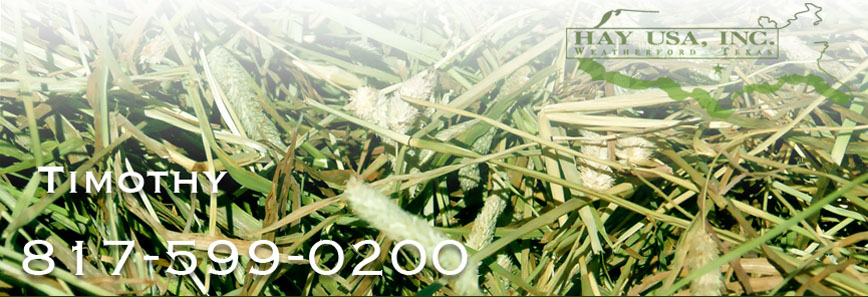
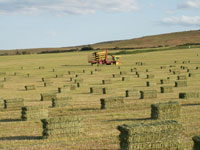
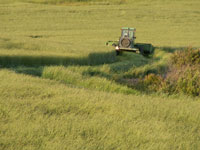
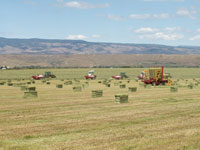
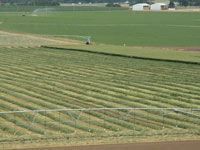
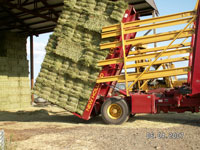
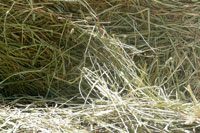
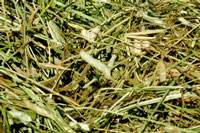
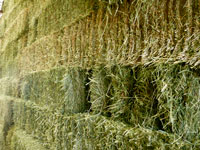
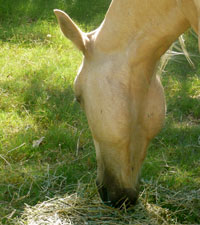
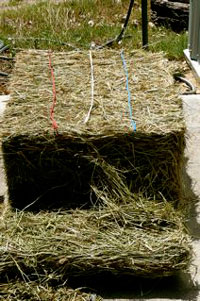
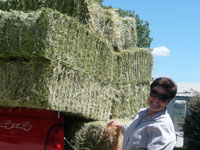
Timothy Hay
“You can’t put regular gas into a Ferrari. Apply that theory to your horses. With premium hay you will enhance your horse’s performance. Ask any top race horse trainer in the country what their hay of choice is; “Timothy” is the answer.
Timothy - Grass was unintentionally introduced to North America by early settlers in 1711 by John Herd and he named the Grass "herd grass". In 1720 a farmer named Timothy Hanson began to cultivate this hay and it has been known by its present name since then. Timothy has now become naturalized throughout most of the US and Canada.
How to recognize Timothy hay
Timothy hay is a wide bladed bright green coarse hay
with long seed heads measuring one to three inches on the first cutting.
The second cutting is softer and darker with smaller heads.
The Cuttings
There are two cuttings of Timothy grass. The first
cutting is coarser, lower in protein and offers more chewing time. First
cutting Timothy is usually used for race horses and export to the Pacific
Rim. The second cutting is brighter in color, softer and much preferred
by the retail client due to its color and texture. Often horses eat it
much faster (remember, faster is not always better. ) Timothy hay is
high in fiber, especially when cut late. It is considered part of standard
mix for grass hay and provides quality nutrition for horses.
Timothy is Recommended
We often recommend Timothy hay for horses in intensive
training programs. Timothy hay is excellent for impaction and colic prone
horses and is fed to horses by surgical clinics after impaction surgery
in conjunction with alfalfa. Timothy hay is excellent for foundered
and obese horses and it has been said to help mares foal 40% easier.
We recommend Timothy hay for horses that are confined to a stable and
have created bad habits. The chewing time Timothy hay offers can help.
. .
Horses are pasture animals. Their normal activities include grazing anywhere from 10-15 hours a day, Problems can arise in horses that are confined to stalls for long periods of time.
• Kicking: Stabled horses may resort
to kicking due to boredom or hunger. Horses that learn to kick can quickly
destroy your stable. One way to decrease this kicking behavior is free
feeding Timothy on the ground so your horses can be as close to his natural
state as possible.
• Box walking: A Horse will continuously walk around their stall in circles due
to boredom. This causes damage to ligaments and joints. To decrease this behavior
offer more turn out time. If your horse must be in a stall, we recommend free
feeding Timothy hay for additional chewing time & offer toys.
• Cribbing: Often caused by boredom, horses will set their incisors into a horizontal
object, arch their neck and pull backwards, swallowing air. This causes a release
of endorphins and can be very addictive. Cribbing can lead to weight loss, gastric
colic, and excessive tooth wear. We recommend free feeding Timothy because of
the extended chewing time. It will help keep them busy and closer to their natural
state.
The Advantages of Timothy hay
- Timothy hay is recommended by Veterinarians
- Timothy hay has natural oils thus creating a shiny coat
- Timothy hay puts a gloss to the horses manure
- Timothy hay helps convert fat to muscle
- Timothy hay does not create fat around the diaphragm and this enhances breathing and endurance
- Timothy hay is the perfect hay for the equine athlete
- Timothy hay can be fed as a complete diet
- Timothy hay is Blister beetle free
- Timothy hay is the most digestible hay of all hays
- Timothy hay is perfect for horses that are protein sensitive
- Timothy hay can be free fed and can help reduce bad stall habits
- Timothy hay helps mares foal easier
- Timothy hay is excellent for foundered horses when soaked to remove excess sugars and starches
- Timothy hay is excellent for post colic surgery
- Timothy hay is excellent for horses that are obese
- Timothy hay is excellent for horses that are allergic to legume hays
- Timothy hay is great for rabbits and alpacas
- We call it the Breakfast of Champions!
Feeding recommendations:
When changing any horses diet we recommend consulting
your veterinarian. Generally speaking, give 2.5% forage / feed per
100# of body total body weight per day. All horses have different needs,
So, a 1,000 pound horse would have 25 pounds of hay. This varies greatly,
depending on the amount of work the horse is asked to do, and on the
type of hay that is fed. It is best to allow horses to eat free-choice
hay throughout the day to promote the health of their digestive systems.
Horses need minerals.
Free feed loose minerals as their bodies require.
Hay or grass is the foundation of the diet for all grazing animals. Hay is usually fed to an animal in place of allowing the animal to graze on grasses in a pasture, particularly in the winter or during times when drought or other conditions make pasture unavailable.
| Do the math & Dare to
compare Hay USA |
If space is a problem, you can depend on Hay USA Inc. We stock premium horse quality hay, in Weatherford Texas year round. There are no minimums and we load your truck! Hay sold by the bale. No need to hunt hay ever again!
Call 817-599-0200 for current
retail prices, semi load & local delivery prices
Hay USA Inc. feeds a wide variety of horses.
We supply hay for top performing horses, breeding facilities large and
small and to the family pride and joy of the one horse owner.
Our clients are educated and can not afford to take risks.
That is why they buy from Hay USA Inc.
Nation
wide Call 817-599-0200
Texas Call 1800-4-HAY-USA
for current retail and full load prices.
Hay USA Inc. feeds a wide variety of horses.
We supply hay for top performing horses, breeding facilities large and
small to the
back yard horse owner.
Our clients are educated and can not afford to take risks.
That is why they buy from Hay USA Inc.
Hay USA Inc. |
|
Business Hours 10 - 6 Tuesday - Saturday |
|
   |
|
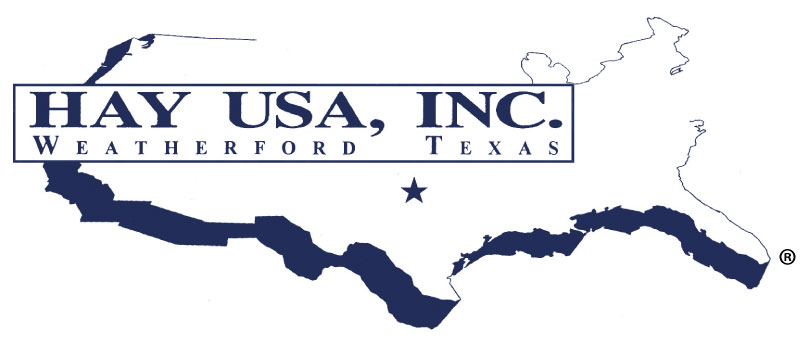 |
|